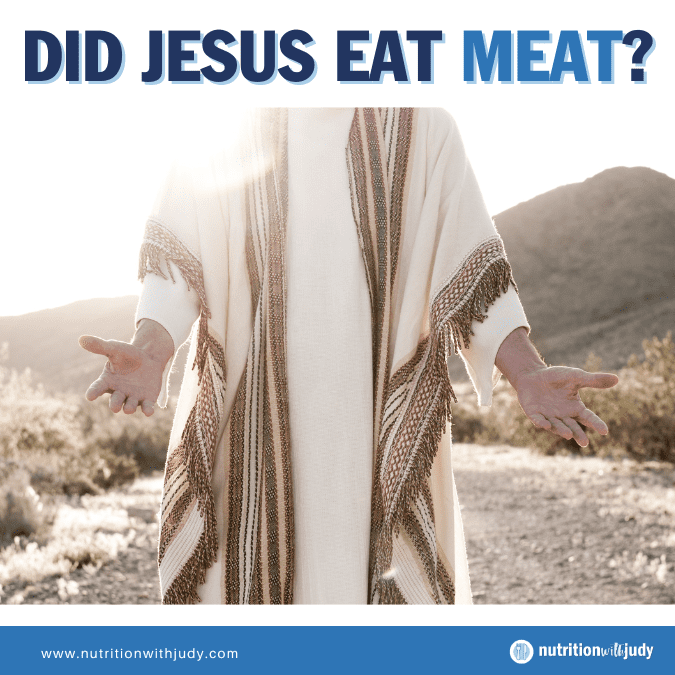

Did Jesus Eat Meat?


Our practice has always specialized in root-cause healing. The search and success for root-cause healing is all-encompassing, requiring a deep analysis of all things mind and body. Since we work with the sickest of the sick, exploring different modalities and thinking outside the box have been essential. One piece of the puzzle that we’ve found incredibly powerful for many of our clients is faith and spirituality.
Speaking from my own experience, the carnivore diet gave me a second chance at life, so I decided to leave my comfortable corporate career behind in order to help others. And while being meat-based has been instrumental in my own healing journey, my faith really saved me. That’s why I share about faith—in hopes of inspiring anyone who needs this significant resource for their healing and to find root-cause healing.
While this article may not be for everyone, this article is written for those who are religious and may have certain religious qualms in terms of diet. Specifically, this explores Christianity, the Bible, and all the important messaging surrounding meat and diet. For the Christian carnivores in our community, how do our spiritual beliefs affect the diet we choose? Is there a “Christian” diet? Did Jesus eat meat?
Religious Dietary Qualms
The carnivore diet is a powerful healing modality for supporting chronic illness, reversing certain conditions, and helping reclaim optimal wellness. Even for those who don’t follow a strict carnivore diet, religious dietary qualms can still be commonly raised regarding eating meat.
Within our carnivore community, sometimes individuals bring up that certain meats such as pork or shellfish are Biblically unacceptable. In other contexts, the Garden of Eden vegan diet during Adam and Eve’s time is also touted. Let’s not forget how often feasting and fasting are mentioned throughout the Biblical text. Let’s explore what the Bible says about meat and diet first.
History: Meat in the Bible
The Bible references meat in various contexts throughout its text. “Meat” in the Bible can refer to animal flesh or food in general. It is referred to as animal flesh in Numbers 11:4-5 and Leviticus 11. Many other passages refer to the flesh of animals as food. In older English translations of the Bible, such as the King James Version (KJV), the term “meat” often meant “food” in general, not necessarily animal flesh.
Dietary Laws
Meat is referenced in several different instances contained in the Bible. You can notice it mentioned within the context of dietary laws. In the books of Leviticus and Deuteronomy, there are specific dietary laws that outline which animals the Israelites were allowed to eat and which were considered unclean. Before Jesus came to redeem our fallen world, there were a lot of laws relating to what we could eat and many other laws and rules around how we can and cannot live our lives.
Animal Sacrifices
Additionally, meat is mentioned during animal sacrifices. Various types of animal sacrifices are described in the Old Testament (before Jesus’ coming), such as in Exodus 29:10-14 and Numbers 6:10-12. These sacrifices were rituals in ancient Israelite worship, and some of these allowed for portions of the meat to be consumed, usually by either the individual or the priests sacrificing the animal.
Feasting and Fasting
Fasting and feasting are also part of the Israelite culture, such as when God imparted The Ten Commandments to Moses on Mount Sinai in Exodus 34. The fasting in Biblical times involved abstaining from certain foods such as meat, followed by a feast where these foods were permitted and used to celebrate. Some Catholics and Christians still participate in regular fasting and feasting, following the Tradition of the Church established by Jesus in the first century.
Stories and Parables
Meat also makes appearances in Biblical stories and parables. For example, in the Old Testament, Abel offers a lamb as a sacrifice in Genesis 4. In the New Testament, we see the fatted calf mentioned in the parable Jesus told of the Prodigal Son in Luke 15:11-32.
Metaphors
We also see meat mentioned in metaphorical uses in the Bible. In the New Testament book of Hebrews 5:11-13, “milk” is mentioned versus “solid food” (or “meat” in some translations) in reference to the basic contrast between different levels of spiritual understanding and teaching.
Warnings and Prophecies
There are also instances where consuming or craving meat leads to problems, such as in Numbers 11. Here, the Israelites were seen complaining about their diet– manna, which is bread that God made rain from the sky. God heard the Israelites’ complaints and then provided quail, leading to a subsequent plague as a punishment for their complaints. However, this punishment was much less about consuming the meat itself and much more about the posture of the Israelites’ hearts. Bread from the sky was not enough for them. It is a theme with the Israelites in the Old Testament being a perpetually ungrateful people– nothing God did for them was enough. Before anyone falls victim to pride, to be clear, the idea is that we are all Israelites.
History: Plant Foods in the Bible
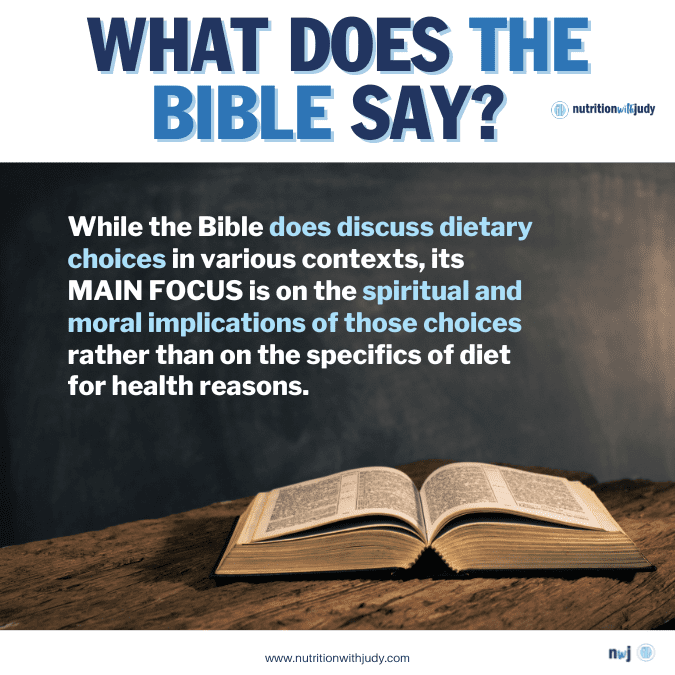

The Bible’s treatment of vegetables and other plant-based foods often reflects broader themes of provision, reliance on God, moral choices, and the blessings and challenges of agricultural life. It’s interesting to note that while the Bible does discuss dietary choices in various contexts, its main focus is on the spiritual and moral implications of those choices rather than on the specifics of diet for health reasons.
Here are a few notable plant-based mentions:
The Daniel Diet
One of the most famous mentions of vegetables in the Bible is in the Book of Daniel. When Daniel and his friends were taken to Babylon, they were offered the king’s food and wine. However, they chose not to defile themselves with it, as the king required Daniel and his friends to bow down to and worship him. Doing so was and is effectively practicing the sin of idolatry, as God is the only one we should bow down to and worship. Instead, Daniel requested a diet of vegetables and water. After ten days on this diet, they appeared healthier than those who ate the royal food. This story can be found in Daniel 1:8-16.
The Eden Diet
In the Garden of Eden, before the Fall, humans were given plants as their primary food source. Genesis 1:29 states:
“Then God said, ‘I give you every seed-bearing plant on the face of the whole earth and every tree that has fruit with seed in it. They will be yours for food.’”
Adam named all of the animals and lived with them peacefully until sin entered the world.
Fasting and Humility
Vegetables, especially when contrasted with meat, can be associated with humility, fasting, and penance. This is seen in the Daniel example and elsewhere, indicating a simpler way of life or a choice to abstain from certain luxuries. Pride is seen as a very dangerous sin, begetting many other sins, and one would do well to avoid it at all costs.
Agriculture and Blessings
The Bible often uses agricultural metaphors and references, given the agrarian societies it frequently addresses. Vegetables, grains, and fruits are seen as blessings from God and are often linked to the land’s fertility and the faithfulness of God in providing for His people.
Proverbs and Wisdom Literature
The Book of Proverbs and other wisdom literature in the Bible occasionally reference agriculture, including vegetable cultivation, to impart wisdom or moral lessons.
The Bible mentions vegetables and plant-based foods in various contexts, yet it primarily focuses on the spiritual and ethical (not health implications) of dietary decisions. These references are often linked to broader themes, such as the reliance on God’s provision.
The New Testament Shift
Now that we know what the Bible says about eating meat as well as eating plants, let’s put it all together. What does this mean about what we should or should not be eating?
Creation
Understand the high-level story that the Bible tells. First is Creation in Genesis 1– God created our Universe and all that it contains, including humans, animals, and plants. He originally created humans to coexist peacefully with all of Creation, including animals. Adam was even assigned the task of naming all of the animals. Shortly after Creation, the diet of Adam and Eve was primarily plants, appropriately calling their home the Garden of Eden.
Fall of Man
You may be thinking– Garden of Eden? Should I go vegan? Hold tight. We need another history lesson for context.
God’s perfect Creation was “ruined” in a sense when sin entered the world. This happened when Adam and Eve committed the first sin in Genesis 3.
The Serpent (Satan) approached Eve and tempted her to eat of the one tree God said to avoid– the Tree of the Knowledge of Good and Evil. God had told Adam and Eve that they could eat from whatever tree they liked, apart from this one. God had these parameters in place to protect Adam and Eve, whom He created in His image. We did and do mean a great deal to our Heavenly Father.
You may be thinking, if God is so loving and all-knowing, why did He even put this forbidden tree in the Garden? And why did He allow the Serpent? This is so we would still have free will. We could still choose Him by honoring and obeying His requests, or we could choose ourselves and ultimately choose destruction.
Unfortunately, human nature gave way, and Adam and Eve partook of the forbidden fruit of the tree. They were deceived by the Serpent, who said to them, “Did God really say not to partake of the tree? He just wants you not to have power like Him.” Satan is the King of Lies, and all he can do is lie; he cannot create like God– he can only cheaply imitate and destroy. Thus, sin entered God’s perfect Creation through the choice of Adam and Eve.
Adam and Eve, once created to live forever with God in His perfect Garden, were now cast out. There were very serious consequences for going against God’s command. Sin overtook the world, resulting in the death of humans and animals; they no longer existed peacefully. God also previously gave humans dominion over the animals, effectively permitting humans to use animals for food.
Life after the Fall of Man differed greatly from life in the Garden of Eden. Sin continued to run rampant throughout the Earth, and humans fell farther and farther away from God as time went on (Sodom and Gomorrah). Without the shedding of blood, there is no forgiveness, hence why animal sacrifice was necessary.
Sin separated us from God for a very long time until Jesus came. Jesus’ coming was foretold from the beginning. God had a plan to bring us back to Him for good. But in the meantime, the Israelites (God’s people) were stuck living very legalistic lives. They were following very stringent laws regarding all aspects of life (including diet), having to sacrifice animals to pay for the sins they committed in an effort not to be so separated from our Creator. The entire Earth yearned for the anticipated coming of the Messiah.
Redemption of Jesus
With Jesus’ arrival in the New Testament of the Bible, there is a distinct shift from the Old Testament legalistic laws. This shift affected all aspects of life, but for our purposes, we will largely focus on the dietary shifts.
Before Jesus’ coming, the Old Testament outlined specific laws regarding food where some foods were considered “clean” or “unclean.” With Jesus’ arrival, He proposed a more inclusive view where all foods could be considered clean. Jesus’ message was about doing away with the legalistic laws and rules since the Fall of Man and sin entering the world.
Jesus came to redeem us by being the final sacrifice for our sins and effectively restoring us to a correct relationship with God the Father, should we accept what He (God the Son) did for us on the Cross. He still gives us free will.
The shift away from the legalistic Old Testament dietary laws to the New Testament perspective on food is part of a broader theological change that occurred with the coming of Jesus Christ as the Redemption of the World and the spread of Christianity.
Jesus changes everything.
Jesus and the Law


The Jewish dietary laws, or kashrut, are a significant part of the Mosaic Law– the set of commands given to Moses on Mount Sinai. When Jesus came, He often challenged the religious leaders’ strict interpretations of these laws. He emphasized the spirit of the law over its literal interpretation.
For instance, in Matthew 15:1-20 and Mark 7:1-23, Jesus is questioned by the Pharisees as to why His disciples do not wash their hands before eating, which was a traditional purification ritual. Jesus uses the opportunity to teach that spiritual purity is more critical than ritual purity. He explains that it’s not what enters the mouth (food) that defiles a person but what comes out of it (words, deeds, and intentions).
Jesus’ Teachings
In the Gospels, Jesus emphasizes that it’s not what goes into a person’s mouth that makes them unclean, but rather what comes out of their mouth. One example can be found in Mark 7:20-23. In this passage, Jesus said:
“What comes out of a person is what defiles them. For it is from within, out of a person’s heart, that evil thoughts come—sexual immorality, theft, murder, adultery, greed, malice, deceit, lewdness, envy, slander, arrogance and folly. All these evils come from inside and defile a person.”
This was quite a shift for the Jewish people who were used to simply following all of the laws and rules of the Old Testament (but perhaps having a heart that was far from God) and that counting was good enough. Jesus said about these individuals in Matthew 23:27.
“Woe to you, teachers of the law and Pharisees, you hypocrites! You are like whitewashed tombs, which look beautiful on the outside but on the inside are full of the bones of the dead and everything unclean.”
Peter’s Vision and Impact


The vision that Peter received in Acts 10 was groundbreaking. The main message, as many theologians interpret it, was that the Gentiles (non-Jewish people) were to be included in God’s salvation plan. However, the method of conveying this message—using unclean animals and the command to eat them—was a direct challenge to the Jewish (Israelite) dietary laws. Peter, a devout Jew, was understandably hesitant. This vision, though, emphasized that the old barriers and distinctions (like dietary laws) were now made obsolete in the face of the new covenant established through Jesus.
Peter’s Vision
In Acts 10:9-16, Peter has a vision where a sheet descends from Heaven containing various animals, including those considered unclean under Jewish law. A voice tells Peter to “kill and eat,” but Peter protests, citing the dietary restrictions. The voice responds:
“Do not call anything impure that God has made clean.”
This vision is repeated three times. While the primary interpretation of this vision is often understood to mean that the Gospel is for both Jews and Gentiles (with Gentiles previously considered “unclean” by Jewish standards), it also underscores the idea that the old dietary restrictions were no longer binding for followers of Jesus.
Paul and Freedom in Christ
The Apostle Paul, in his mission to spread Christianity to the Gentiles, often dealt with communities comprised of both Jewish and Gentile believers. The issue of food, especially meat sacrificed to idols, was a contentious one in these mixed communities.
Paul’s Teachings
The Apostle Paul also addressed the topic of food in his letters. In Romans 14 and 1 Corinthians 8, he discusses the issue of eating meat that has been sacrificed to idols. While he emphasizes that all foods are clean in themselves, he also advises believers to be mindful of their actions so as not to cause weaker believers to stumble in their faith.
Closing Thoughts
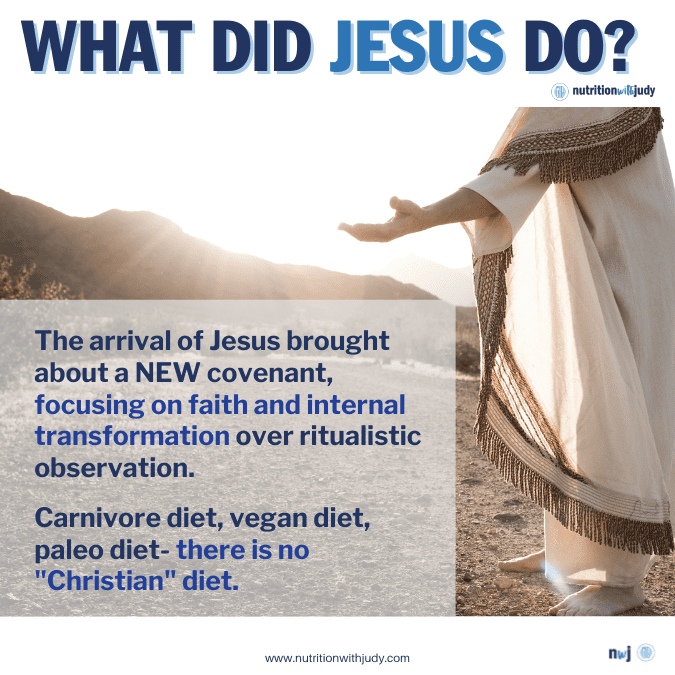

This change in perspective on food and dietary laws is a manifestation of the New Testament’s broader message: the arrival of Jesus brought about a new covenant of grace, focusing on faith and internal transformation over ritualistic observance of laws.
Instead of having to sacrifice animals to atone for sin due the the Fall of Man, Jesus was the ultimate sacrifice and our Redemption. By His grace, He sacrificed Himself for us and our sins, thereby uniting us back to God, should we accept what He has done for us.
Recall that we became separated from God when sin entered the world via Adam and Eve in Genesis. The Old Testament laws, including dietary ones, were seen by early Christian theologians as pointing forward to Christ, and with His arrival, believers were now under this new covenant of grace.
However, it’s crucial to understand that for many Jews during (and after) the time of Jesus, these dietary laws remained (and remain) deeply significant, not merely as ritualistic observances but as expressions of identity, obedience, and relationship with God. It was and still is their culture and identity.
The New Testament teachings primarily addressed a predominantly Gentile (non-Jewish people) audience that was coming to faith in Christ outside the framework of the Jewish tradition. When Jesus redeemed the world, He came for us all, not just the Jewish “chosen people.”
Overall, the New Testament emphasizes the internal state of a believer’s heart and actions over strict external observances, including dietary laws. However, it’s also noted that believers should act with love and consideration for others, especially in matters that might cause others to doubt or struggle with their faith.
Carnivore diet, vegan diet, paleo diet– there is no “Christian” diet. And being Jewish, Jesus did eat meat. Jesus also makes it clear that diet is not what God looks at. He looks at our hearts. Only He can see what is truly there, but we can get a good idea from what comes out of our mouths. As Luke 6:45 reminds us, “For out of the overflow of the heart, the mouth speaks.”
When we focus on the specific laws of the Bible (specifically from the Old Testament), I personally think we are missing the point of grace and why Jesus died on the cross. As I discussed in my faith video, if eating a carnivore diet helps you be healthier to serve others and use the talents God’s given you, I call that a win.
I’ve been asked countless times about Jesus and the dietary laws in the Bible. I hope this article helps put things into perspective or at least gives you more things to consider.
Bible Verses and Chapter References to Consider
In the podcast, I mentioned that I would share specific chapters from the Bible that offer insightful life tips and practical guidance. These selections have been a great resource for understanding how to navigate life’s challenges and opportunities.
- YouTube: Faith Episode
- Podcast: Faith Episode
Fear
Therefore do not worry about tomorrow, for tomorrow will worry about itself. Each day has enough trouble of its own. — Matthew 6:34
For God has not given us a spirit of fear, but of power and of love and of a sound mind. — 2 Timothy 1:7
So do not fear, for I am with you; do not be dismayed, for I am your God. I will strengthen you and help you; I will uphold you with my righteous right hand. — Isaiah 41:10
Nehemiah
The first time I experienced real social media backlash for sharing something against status quo was frankly very difficult. Amid my pain, our children watched the story of Nehemiah and the wall. It was in this story that I found the strength to keep doing what I was doing. It has been a couple of years now, but maybe Nehemiah’s story can help you. In the passage below, Nehemiah is engaged in the task of rebuilding the walls of Jerusalem and is facing opposition and distractions. His response to his detractors is a statement of commitment and determination.
The verse reads:
But they were scheming to harm me; 3 so I sent messengers to them with this reply: “I am carrying on a great project and cannot go down. Why should the work stop while I leave it and go down to you?” 4 Four times they sent me the same message, and each time I gave them the same answer. — Nehemiah 6:2-4
This verse shares Nehemiah’s resolve to stand firm in his convictions and continue his important work, even in the face of opposition and potential isolation. Nehemiah’s story is often shared as an example of leadership, focus, and the courage to stand alone for what is right.
Chapters to Consider Reading
- Proverbs: This book is full of wisdom and practical advice for daily living. It covers topics like wisdom, discipline, and how to live a righteous life.
- Ecclesiastes: This book delves into the meaning of life and the pursuit of fulfillment, discussing the ephemeral nature of worldly pleasures and the importance of fearing God and keeping his commandments.
- The Sermon on the Mount (Matthew 5-7): These chapters in the Gospel of Matthew contain some of Jesus’ most significant teachings, including the Beatitudes, the Lord’s Prayer, and instructions on forgiveness and love.
- James: This book offers practical advice on living a Christian life, emphasizing the importance of acting out one’s faith through good works.
- Romans: While theological in nature, Romans also discusses how Christians should live their lives, emphasizing faith in Jesus Christ and living according to the Spirit.
- Ephesians: This book, particularly chapters 4-6, gives instructions on Christian living, covering topics like unity, living in the light, and family relationships.
- Philippians: Known for its emphasis on joy and contentment in Christ, this book also instructs on humility and considering others above oneself.
- Psalms: While mainly known for its poetic verses and expressions of faith, Psalms also offers insights into dealing with life’s challenges and maintaining faith in God.
I was fascinated by the healing effects of a meat-only carnivore diet on my own health. This curiosity led me to delve into the underlying reasons behind the healing of my eating disorder and mental health imbalances (e.g., depression). I immersed myself in peer-reviewed and evidence-based research, while also absorbing everything I could from the experiences of my clients and patients. After years dedicated to research and truth-seeking in both my clinical practice and research, I ultimately found solace, peace, and truth in my faith in God.
Science is ever-evolving and while we seek answers for healing and understanding, there is just so much we may never control or understand. But prayer and faith go a long way.
In love and health,
Judy and the NwJ Team


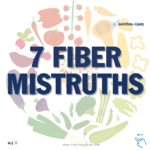
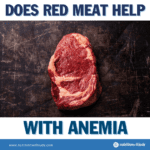
Kim Horton
December 5, 2023 at 8:46 amDear Judy, this is one of the most well written articles by a Christian regarding diet and eating lifestyles. We Christians can get so hung up on right and wrong and get so legalistic in so many areas and completely miss the point!As you stated, Jesus changed everything and God looks at my heart, not my behavior. If I let Him deal with my heart my behavior will follow. We have the freedom to choose what way of eating works best for us , without pointing a finger at our brother or sister and insisting they do it our way. I believe that He will work with us in whatever area we hand over to Him and lead us into all truth. Anyhow, thank you for taking the time to write such a detailed and informative article! Galatians 5:1 says It was for liberty that Christ has set us free. Stand firm then and do not be hindered again by a yoke of slavery. We have to ask ourselves what are we enslaved to? I’d say for most of us struggling with food issues and health it’s the carbs and sugar addiction. If we start there and begin to make serious changes we are well on our way to freedom. Thank you for all your hard work in advocating a healthy lifestyle and thanks again for such a great article!
Craig Toni
December 5, 2023 at 6:23 pmExcellent article Judy. You hit all of the relevant points regarding God and diet. Although I have to say that Abel, the shepherd, his mental cognition appeared to be much better than his brother the farmers cognition. For he was astute enough to offer God the best of his animals as a sacrifice in contrast with his vegan….I mean, farmer brother who didn’t offer his best produce to God. I think this may have been the start of the nutrient deficiency on the plant based diet😂😂😂. All in good fun..Have a Blessed Christmas. Again very well thought out and appropriate article.
Christine James
December 7, 2023 at 7:36 amThank you thank you,, may God continue His work thru you…
Phillip Irish
December 25, 2023 at 5:37 pmAs a pastor following a carnivore life style I applaud your article. I will be sharing it with the congregational “lunch bunch” nutrition group we have. Carnivore is now my second gospel!
Charles Rigsby
December 26, 2023 at 10:58 amThank you, Judy. You are truly doing God’s work!
Laura J. Rush
December 30, 2023 at 6:37 amExcellent article, thank you from the bottom of my heart! Since my mostly carnivore journey began in February 2023, my spiritual life has blossomed and I strive to live up to the Lord’s words, though I continually falter. There is no doubt having a clearer mind from my animal-based diet has helped me physically and mentally, way more than expected. Thank you again!
Bella Heblan
December 30, 2023 at 7:38 pmAwesome article! Thank you for sharing your faith, and God’s word! ❤️
Rebecca S.
December 31, 2023 at 3:14 pmIt’s so tragic to me that the church continues to teach so many falsehoods and man-made lies and traditions about the ways of YHVH, our Creator, instead of choosing to trust Him and believe Him when He said His ways and His commandments are FOREVER and they are GOOD. It’s incredibly heartbreaking how cherry-picked and out-of-context Bible verses are taken and how so many gloss over the words where it specifies YHVH’s law is still in place for His children. It’s appalling how many Christians continue to say the ways, commandments and statutes of YHVH, given by Moshe (Moses) in the first 5 books of the Bible, The Torah, are too hard for us, they aren’t meant for us today, they were done away with because “Jesus died” so we don’t have to follow what He did. Yahusha followed His Father’s ways! He lived and walked out the Torah, just like all of the prophets who came before Him – they all tried to get the children of YHVH to get rid of the ways of nations and bring them back to His ways.
We are told time and again how GOOD YHVH’s laws are for us and yet the church just trashes them and says they aren’t for us. Let’s consider some verses:
Romans 7:12 “So the TORAH is HOLY; that is, the commandment is holy, just and good.”
1 John 5:2-3 “By this we know that we love the children of YAH, when we love YHVH, and obey His commandments. For this is the love of YAH, that we obey His commandments and His commandments are not grievous.”
1 John 3:4 “Everyone who keeps sinning is violating Torah – indeed sin is violation of Torah.”
Psalm 19:7-11 “The Torah of YHVH is perfect, restoring the soul; the testimony of YHVH is sure, making wise the simple. The statutes of YHVH are right, rejoicing the heart; the commandment of YHVH is pure, enlightening the eyes. The fear of YHVH is clean, enduring forever; the judgements of YHVH are true and righteous altogether. More to be desired are they than gold, yea, than much fine gold; sweeter also than honey and the honeycomb. Moreover by them is your servant warned and in guarding of them there is great reward.”
Psalm 93:5 “Your instructions are very sure; holiness befits your house YHVH, forever.”
Psalm 119:172 “Let my tongue sing of Your promise, because all Your commandments are righteous.”
Psalm 119:1 “Blessed are the undefiled in the Way, who walk in the Torah of YHVH. Blessed are they that guard His testimonies, and that seek Him with the whole heart.”
Deuteronomy 6:24-25 “And YHVH commanded us to do all these statutes, to fear YHVH Elohaynu, for our good always, that He might preserve us alive, as it is this day. And it shall be our righteousness, IF we guard to do all these commandments before YHVH Eloyhaynu, as He commanded us.”
Deuteronomy 30:15-20 “See, I have set before you this day life and good, and death and evil; In that I command you this day to love YHVH Elohayka, to walk in His ways and to guard His commandments and His statutes and His judgements, that you may live and multiply and YHVH Elohayka shall bless you in the land whither you go to possess it. But if your heart turns away, so that you will not hear, but shall be drawn away and worship other elohiym (gods), and serve them; I denounce unto you this day, that you shall surely perish, and that you shall not prolong your days upon the land, whither you pass over the Yarden to go to possess it. I call the heavens and the earth to record this day against you, that I have set before you life and death, blessing and cursing: therefore choose life, that both you and your seed may live. That you may love YHVH Elohayka and that you may obey His voice, and that you may cleave unto Him: for He is your life and the length of your days that you may dwell in the land which YHVH swore unto your fathers, Avraham, to Yitschaq and to Ya’aqov, to give them.”
Malachi 4:4 “Remember the Torah of Mosheh (Moses) my servant, which I commanded unto him in Chorev for all Yashar’el with the commandments and judgments.”
A few other notes, Peter’s dream had nothing to do with food, and he even expresses what his dream meant, twice! It was about people, and how he wasn’t meant to discriminate against those who YHVH has called. Read the entire chapter! “…but YHVH has showed me that I should not call any man common or unclean….Then Kepha (Peter) opened his mouth and said, Of a truth I perceive that YAH is no respecter of persons: But in every nation he that fears Him, and works righteousness, is accepted with Him.” Acts 10:28, 34, 35.
We’re also warned in Zechariah 14:16-17, about the nations in the millennium reign: “Finally, everyone remaining from all the nations that came to attack Yerushalayim will go up every year to worship the king, Adonai-Tzva’ot, and to keep the festival of Sukkot. 17 If any of the families of the earth does not go up to Yerushalayim to worship the king, Adonai-Tzva’ot, no rain will fall on them.” So, if we are going to be celebrating the Festival of Sukkot later on, when Yahusha returns, why don’t we have to do it now?
Yes, we are allowed to eat meat, look how much meat the Levitical priesthood ate, and there is not one verse that says, “you are not allowed to eat meat.” (The same way there is no verse that says, “you who call yourself children of YHVH don’t have to follow His loving commandments anymore.” or any other statement of the kind). If meat was bad for us our wise, intelligent and loving heavenly Father would have said no right from the beginning. Instead, He wisely said not to eat the unclean animals, and He has pretty good reasons for it. If you really study the unclean animals it becomes clear from a health standpoint why we shouldn’t eat them. Those animals are meant to clean up the earth; they eat the dead and decaying, and they harbour parasites and diseases that make us sick when we consume them.
As I shared on your Instagram post about this, I really encourage you to read two books, Eat Like Jesus, by Andew L. Hoy (this book will give a much better understanding as to why Daniel chose not to eat from the king’s table) and Walk in the Light: The Law and Grace, Examining the Relevance and Application of the Torah to All Believers by Todd D. Bennett.
Rebecca
January 8, 2024 at 6:21 pmIt’s so tragic to me that the church continues to teach so many falsehoods and man-made lies and traditions about the ways of YHVH, our Creator, instead of choosing to trust Him and believe Him when He said His ways and His commandments are FOREVER and they are GOOD. It’s incredibly heartbreaking how cherry-picked and out-of-context Bible verses are taken and how so many gloss over the words where it specifies YHVH’s law is still in place for His children. It’s appalling how many Christians continue to say the ways, commandments and statutes of YHVH, given by Moshe (Moses) in the first 5 books of the Bible, The Torah, are too hard for us, they aren’t meant for us today, they were done away with because “Jesus died” so we don’t have to follow what He did. Yahusha followed His Father’s ways! He lived and walked out the Torah, just like all of the prophets who came before Him – they all tried to get the children of YHVH to get rid of the ways of nations and bring them back to His ways.
We are told time and again how GOOD YHVH’s laws are for us and yet the church just trashes them and says they aren’t for us. Let’s consider some verses:
Romans 7:12 “So the TORAH is HOLY; that is, the commandment is holy, just and good.”
1 John 5:2-3 “By this we know that we love the children of YAH, when we love YHVH, and obey His commandments. For this is the love of YAH, that we obey His commandments and His commandments are not grievous.”
1 John 3:4 “Everyone who keeps sinning is violating Torah – indeed sin is violation of Torah.”
Psalm 19:7-11 “The Torah of YHVH is perfect, restoring the soul; the testimony of YHVH is sure, making wise the simple. The statutes of YHVH are right, rejoicing the heart; the commandment of YHVH is pure, enlightening the eyes. The fear of YHVH is clean, enduring forever; the judgements of YHVH are true and righteous altogether. More to be desired are they than gold, yea, than much fine gold; sweeter also than honey and the honeycomb. Moreover by them is your servant warned and in guarding of them there is great reward.”
Psalm 93:5 “Your instructions are very sure; holiness befits your house YHVH, forever.”
Psalm 119:172 “Let my tongue sing of Your promise, because all Your commandments are righteous.”
Psalm 119:1 “Blessed are the undefiled in the Way, who walk in the Torah of YHVH. Blessed are they that guard His testimonies, and that seek Him with the whole heart.”
Deuteronomy 6:24-25 “And YHVH commanded us to do all these statutes, to fear YHVH Elohaynu, for our good always, that He might preserve us alive, as it is this day. And it shall be our righteousness, IF we guard to do all these commandments before YHVH Eloyhaynu, as He commanded us.”
Deuteronomy 30:15-20 “See, I have set before you this day life and good, and death and evil; In that I command you this day to love YHVH Elohayka, to walk in His ways and to guard His commandments and His statutes and His judgements, that you may live and multiply and YHVH Elohayka shall bless you in the land whither you go to possess it. But if your heart turns away, so that you will not hear, but shall be drawn away and worship other elohiym (gods), and serve them; I denounce unto you this day, that you shall surely perish, and that you shall not prolong your days upon the land, whither you pass over the Yarden to go to possess it. I call the heavens and the earth to record this day against you, that I have set before you life and death, blessing and cursing: therefore choose life, that both you and your seed may live. That you may love YHVH Elohayka and that you may obey His voice, and that you may cleave unto Him: for He is your life and the length of your days that you may dwell in the land which YHVH swore unto your fathers, Avraham, to Yitschaq and to Ya’aqov, to give them.”
Malachi 4:4 “Remember the Torah of Mosheh (Moses) my servant, which I commanded unto him in Chorev for all Yashar’el with the commandments and judgments.”
A few other notes, Peter’s dream had nothing to do with food, and he even expresses what his dream meant, twice! It was about people, and how he wasn’t meant to discriminate against those who YHVH has called. Read the entire chapter! “…but YHVH has showed me that I should not call any man common or unclean….Then Kepha (Peter) opened his mouth and said, Of a truth I perceive that YAH is no respecter of persons: But in every nation he that fears Him, and works righteousness, is accepted with Him.” Acts 10:28, 34, 35.
We’re also warned in Zechariah 14:16-17, about the nations in the millennium reign: “Finally, everyone remaining from all the nations that came to attack Yerushalayim will go up every year to worship the king, Adonai-Tzva’ot, and to keep the festival of Sukkot. 17 If any of the families of the earth does not go up to Yerushalayim to worship the king, Adonai-Tzva’ot, no rain will fall on them.” So, if we are going to be celebrating the Festival of Sukkot later on, when Yahusha returns, why don’t we have to do it now?
Yes, we are allowed to eat meat, look how much meat the Levitical priesthood ate, and there is not one verse that says, “you are not allowed to eat meat.” (The same way there is no verse that says, “you who call yourself children of YHVH don’t have to follow His loving commandments anymore.” or any other statement of the kind). If meat was bad for us our wise, intelligent and loving heavenly Father would have said no right from the beginning. Instead, He wisely said not to eat the unclean animals, and He has pretty good reasons for it. If you really study the unclean animals it becomes clear from a health standpoint why we shouldn’t eat them. Those animals are meant to clean up the earth; they eat the dead and decaying, and they harbour parasites and diseases that make us sick when we consume them.
As I shared on your Instagram post about this, I really encourage you to read two books, Eat Like Jesus, by Andew L. Hoy (this book will give a much better understanding as to why Daniel chose not to eat from the king’s table) and Walk in the Light: The Law and Grace, Examining the Relevance and Application of the Torah to All Believers by Todd D. Bennett.
CJ Sullivan
January 9, 2024 at 12:03 amThank you Judy for a wonderful article!!!
Laurie
February 18, 2024 at 10:56 amJudy, Thank you SO much for an excellent article. May we always search the scripture for God’s will in our lives. You have a beautiful and humble heart. May HE bless you in your important work.
Twyla varnadore
April 22, 2024 at 11:44 pmthank you judy and thank you JESUS